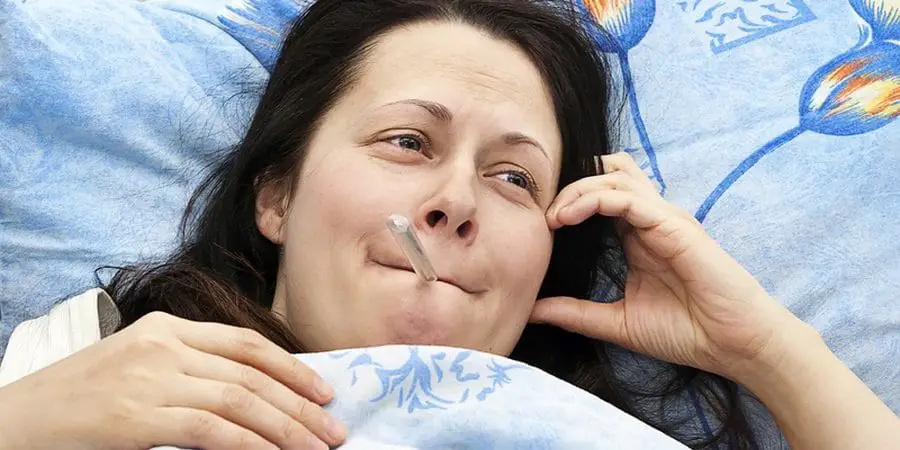
Medically Reviewed by
June 29, 2020
Oversleeping might be usually bad, but when you are sick, you need a lot of sleep. You probably even feel like you don’t have the effort to do many things. Furthermore, it is definitely better to rest as much as possible when sick. But is it okay to sleep a lot when you are ill, and is there an amount of sleep that is too much?
It is very rare to oversleep even if you are sick. You really need to sleep a lot then. Recovering takes a lot of energy, and that is why you need to rest much more than usual. However, there is a possibility that you will sleep too much, even if you are sick. Especially if sleeping a lot continues for several days.
Therefore, you probably want to know how much sleep is too much and how much you should sleep when you are sick. Is it possible to oversleep when you are sick?
But first, let’s find out,
Is Oversleeping Usually Bad?
Typically, an average and standard amount of sleep is about eight hours. For healthy and normal adults in the age range from 18 to 64 years, the typical need per night is seven to nine hours sleep.
If you sleep every night for more than nine hours and you feel that less than that is not enough for you, you may be oversleeping. But, about 2% of people actually need longer sleep naturally.
Oversleeping may have some severe health impacts, on both mental and physical wellness. Just a few examples:
- Depression
- Higher risk of diabetes
- Higher risk of heart disease
- Cognitive impairment
- Increased pain
But is there a risk for any of these if you sleep a lot when you are sick?
Why Do You Need More Sleep When You Are Sick?
The answer lies in the recovering process. After an infection, your body needs increased sleep. Your body is fighting against the disease and that takes a lot of energy.
Also, when you are sick (maybe you have the flu), you need to rest, because without rest your recovery process might be delayed. Without enough rest, your condition may get worse, and you may get an additional bacterial infection on top of the flu. So sleeping a lot when sick is very important.
It is true that when you have a cold, you will most likely get better even if you don’t rest enough. Sometimes it might not require much more sleeping than usual, but at least resting a little more would do good to you.
However, for example, if you don’t rest enough when you are facing a viral infection, you may get a secondary infection, such as pneumonia. That is one reason why resting well and sleeping are so important when having a cold.
Usually, it takes just a couple of days for you to get better and for the amount of sleep needed to return to the normal level.
How Much Sleep Is Good When You Are Sick?
It depends on what kind of an illness you have. If it is an ordinary flu and you have a fever, it is undoubtedly good to sleep for most of the day, if possible.
It is not at all strange to sleep much longer than usual when sick. Also, usually you may sleep in multiple phases. Maybe you will sleep eight hours at night, and then some more in shorter periods during the daytime.
However, if you have a more severe disease, you may need more sleep for several days. Of course, when it gets more serious than a regular flu, you have to contact your doctor.
How about:
For instance, is it okay to sleep for 14 hours when sick?
When you are sick, you definitely sleep a lot more than average. Sleeping for 14 hours or even more might be quite normal for some people when recovering from a flu or a similar illness.
One reason why you might sleep a lot when sick may be the medicines that you need to take. Some medications may cause such a deep sleep that you might even sleep for 24 hours!
When medicines finally start working, the fever decreases, your condition gets better, and you won’t need so much sleep anymore.
But this also differs from person to person. Those who sleep a lot in normal conditions usually sleep much more when sick. And those who usually get by with less sleep won’t likely sleep so much more when sick.
However, if you continually (many days and weeks) sleep for 14 hours or so and feel the need to sleep even more after waking up, it may be a sign of narcolepsy or another sleep disorder. In that case, contact your doctor.
What Happens When You Sleep a Lot When You Are Sick?
First and foremost, the fact is that you will probably get well, sooner or later. However, sleeping helps your body to fight against viruses or bacteria that caused your sickness.
Because of all of this fighting your body is doing, you need to rest and sleep a lot. It takes a lot of energy for your body to heal and recover from the illness.
Is there a danger of oversleeping when you are sick?
Sleeping enough is crucial, but if you usually sleep a lot, you probably want to sleep a lot more when sick.
Basically, you need to sleep a lot when you are sick. So don’t worry if you sleep a lot more than usual!
Oversleeping is not dangerous, if it doesn’t continue for an extended period.
What to do if you can’t sleep when you are sick?
Sometimes, when you are sick, it might feel painful to lie still in your bed. Or for example, your pulse might be racing and that might make it difficult to fall asleep.
If these symptoms continue and you are not feeling well, you need to contact your doctor.
But if it’s temporary, you should try to focus on relaxing. Try to take even, deep breaths. It may take a few minutes until you relax and calm down.
What Should You Do If You Sleep a Lot When You Are Sick?
You need to sleep a lot when sick. Therefore, you should be able to feel as comfortable as possible when you are sick. Follow these steps:
- Take care of hydration. When you are sick, you need to stay hydrated. It might be a bit hard if you need to sleep a lot. Try to drink hot water from time to time. Eat some juicy fruits.
- Set your bed as comfortable as possible. Get extra pillows if needed. Put warm socks on your feet.
- Keep the bedroom cool and dark. It is just better to give your brain a signal that you can keep on sleeping if necessary.
- If you experience vomiting, diarrhea, any dizziness or a high fever, it is better not to take any sleeping medicines. Especially, with vomiting, there is a danger of suffocating if you won’t wake up.
- Just rest and sleep. When you feel sick, it is better not to try to do anything that doesn’t feel good. Hence when you feel tired and want to sleep, don’t try to stay awake. After a few days when you feel better, you can start to do some activities.
- If you feel some severe signs of illness such as markedly increased heart rate, continually high body temperature, difficulties to keep yourself hydrated or breathing difficulties, it is better to see your doctor.
You Will Survive
Sleeping a lot when you are sick is crucial. It helps you to recover faster, and when your body is fighting against the disease you need extra energy. That is why you are more tired during the time of sickness. However, if you oversleep continually, it may be a sign of severe illness. In that case, contact your doctor.
Sources:
- Cohen S, Doyle W, Alper C, Janicki-Deverts D, Turner R. Sleep Habits and Susceptibility to the Common Cold. Arch Intern Med. 2009;169(1):62. doi:10.1001/archinternmed.2008.505
- How to Sleep Better – HelpGuide.org. Helpguide.org. https://www.helpguide.org/articles/sleep/getting-better-sleep.htm. Published 2020. Accessed June 29, 2020.
- How Much Sleep Do We Really Need? – Sleep Foundation. Sleep Foundation. https://www.sleepfoundation.org/articles/how-much-sleep-do-we-really-need. Published 2020. Accessed June 29, 2020.
- Sleep Tips for a Cold or the Flu. WebMD. https://symptoms.webmd.com/cold-flu-map/sleep-better-cold-flu. Published 2020. Accessed June 29, 2020.
- Breus D. Yes, You CAN Sleep Too Much—Here’s Why Oversleeping Is A Problem – Your Guide to Better Sleep. Your Guide to Better Sleep. https://thesleepdoctor.com/2018/07/16/yes-you-can-sleep-too-much-heres-why-oversleeping-is-a-problem/. Published 2020. Accessed June 29, 2020.
- Oversleeping: The Effects & Health Risks of Sleeping Too Much. Amerisleep. https://amerisleep.com/blog/oversleeping-the-health-effects/. Published 2020. Accessed June 29, 2020.


